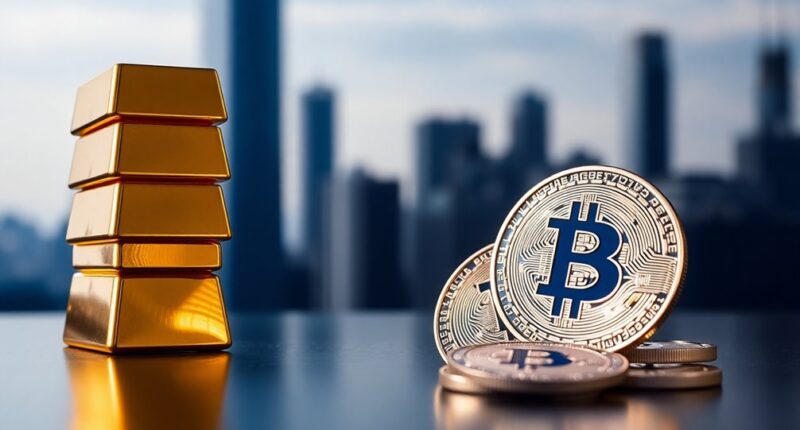As you consider your investment options heading into 2025, the debate between Bitcoin and gold becomes increasingly relevant. Both assets offer unique advantages that cater to different financial strategies. While gold has long been a symbol of stability, Bitcoin's rise as a decentralized asset presents intriguing possibilities. Which one aligns better with your goals? The answer might surprise you as market dynamics continue to evolve.

As you look ahead to 2025, the debate between Bitcoin and gold as investment options intensifies. Both assets have their merits, but your choice should depend on your risk tolerance and investment goals.
Gold, with its historical role as a safe-haven asset, offers stability during economic downturns. For centuries, it has been the go-to option for investors seeking predictability in uncertain times. In contrast, Bitcoin presents a volatile landscape, delivering the potential for significant gains while also exposing you to substantial risks. Central banks diversifying their reserves away from the US dollar to gold underscores the increasing demand for this traditional asset. Furthermore, incorporating a Bitcoin IRA can provide tax-efficient growth for your retirement savings, adding a strategic layer to your investment portfolio.
Market sentiment plays a crucial role in Bitcoin's value, swinging with news and regulatory developments. This unpredictability can be daunting if you're not prepared for wild price fluctuations. Gold, on the other hand, provides a more stable performance, allowing you to make more informed decisions based on its historical trends.
If you're looking for a reliable asset that won't leave you anxious about sudden market shifts, gold might be your best bet.
Both Bitcoin and gold serve as inflation hedges, but they do so differently. With rising geopolitical uncertainties, gold tends to shine, often performing well during conflicts. Meanwhile, Bitcoin's decentralized nature attracts those wary of traditional systems.
Its global adoption is on the rise, yet it still faces regulatory risks that can impact its future. Countries like El Salvador embracing Bitcoin show its growing acceptance, but you must remain vigilant about its shifting regulatory landscape.
When considering performance, gold usually provides steady returns, whereas Bitcoin has shown exponential growth despite its volatility. The Bitcoin-to-gold ratio reaching new highs indicates Bitcoin's increasing purchasing power, but don't forget that historical returns don't guarantee future performance.
Institutional interest in Bitcoin is growing, which could enhance its legitimacy and liquidity, making it a more attractive option for some investors.
Ultimately, your investment strategy should reflect your individual risk tolerance. If you prefer the security of physical assets, gold might be your choice. If you're willing to embrace the risks for potential high rewards, Bitcoin could be your avenue for growth.
A diversified portfolio that includes both assets can balance risk and reward, allowing you to navigate the complexities of the financial landscape as it evolves. As you weigh your options, remember that the right choice hinges on understanding your financial goals and the market dynamics at play.









